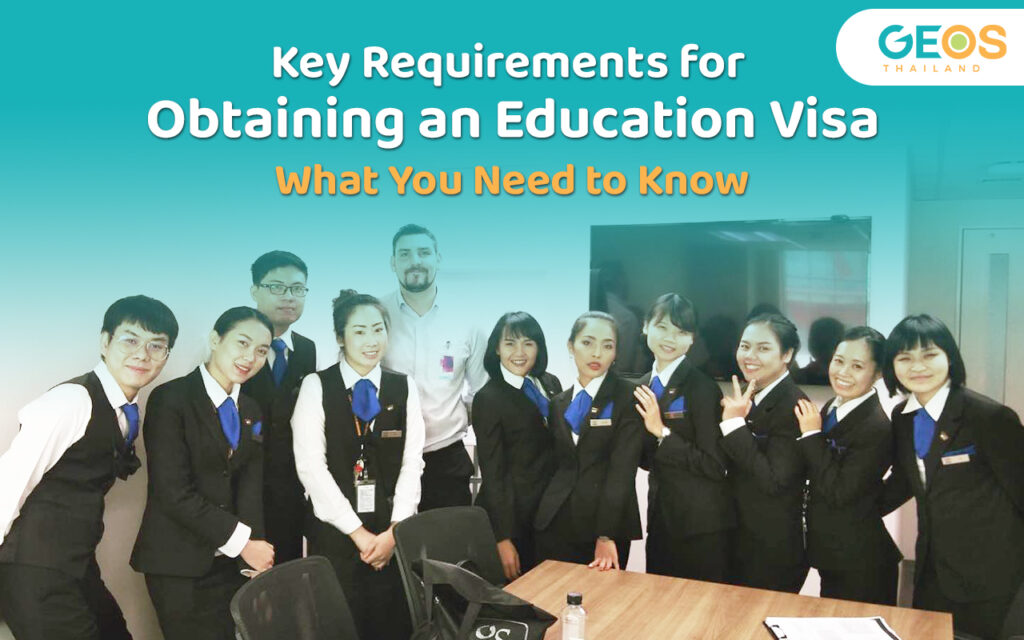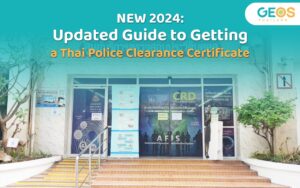
Key Requirements for Obtaining an Education Visa: What You Need to Know
Are you dreaming of studying abroad in the captivating country of Thailand? Do you have your sights set on pursuing an education visa to experience the vibrant culture, stunning landscapes, and renowned Thai hospitality firsthand? If so, you’re in for an exciting journey! However, before embarking on this adventure, it’s crucial to understand the key points to obtain an education visa requirements. In this blog post, we will guide you through everything you need to know – from general requirements and necessary documentation to the application process itself. So let’s dive right in and explore how you can make your dreams of studying in Thailand a reality!

Understanding Education Visas
Education visa is a type of visa that allows individuals to stay in Thailand for the purpose of pursuing their studies at a recognized educational institution. Education visas are particularly popular among international students who wish to immerse themselves in Thai culture while gaining valuable knowledge and skills. Whether you’re interested in learning the Thai language or pursuing a specific academic program, an education visa provides you with the legal permission to do so.
One important thing to note is that education visas come with certain requirements and restrictions. For instance, they typically require students to be enrolled in full-time courses at accredited institutions and maintain satisfactory academic progress throughout their studies. It’s essential to familiarize yourself with these requirements before applying for an education visa.
Moreover, education visas are usually valid for one year initially but can be extended depending on your course duration or academic progress. This flexibility allows students ample time to complete their chosen program without having to worry about constantly renewing their visa status.
General Requirements for an Education Visa
Obtaining an education visa in Thailand can be a straightforward process if you meet the necessary requirements. To apply for an education visa, there are certain general criteria that you must fulfill.
You will need to enroll in a recognized educational institution or language school in Thailand. This could be a university, college, or even a private English language school. The key is to choose an institution that is approved by the Thai Ministry of Education.
Another requirement is obtaining valid health insurance coverage for the duration of your stay in Thailand. This ensures that you have access to medical services and safeguards against any unforeseen circumstances.
Additionally, it is essential to submit all required documents accurately and on time. These may include your passport with at least six months validity remaining, recent photographs, acceptance letters from the educational institution, and completed application forms.
It’s important to note that meeting these general requirements does not guarantee approval of your education visa application. Each case is reviewed individually by Thai immigration officials who assess factors such as previous travel history and intentions for studying in Thailand.
By understanding and fulfilling these general requirements for an education visa in Thailand, you can increase your chances of obtaining one successfully!
Documentation Needed
To obtain an education visa in Thailand, there are certain documents you will need to gather and prepare. The following is a list of the key documentation needed for your application:
1. Passport: You will need a valid passport with at least six months remaining before expiration.
2. Admission Letter: You must provide an official acceptance letter from the educational institution where you plan to study.
3. Proof of Enrollment: This can include a certificate or letter confirming your enrollment in the course or program.
4. Financial Documents: You will need to show proof of sufficient funds to support yourself during your stay in Thailand, such as bank statements or sponsorship letters.
5. Medical Certificate: A medical certificate stating that you are free from contagious diseases is required.
6. Educational Certificates: Depending on the level of education you are pursuing, you may be asked to provide copies of previous educational certificates and transcripts.
7. Photographs: Two recent passport-sized photographs are typically required for your application.
8. Visa Application Form: You will need to complete the appropriate visa application form provided by the Thai embassy or consulate in your home country.
It’s important to note that these requirements may vary slightly depending on individual circumstances and the specific school or program you plan to attend. It’s always recommended to consult with an immigration lawyer or expert who can guide you through the process and ensure all necessary documents are prepared correctly.
Application Process
Once you have gathered all the necessary documentation, it’s time to start the application process for your education visa. This step can sometimes be confusing and overwhelming, but with some guidance, it can be a smooth journey.
The first thing you need to do is find a school or educational institution in Thailand that meets the requirements for issuing an education visa. Look for schools that offer English courses or other programs of interest to you. Once you have chosen a school, contact them directly to inquire about their application process.
Each school may have slightly different requirements and procedures, so make sure to follow their instructions carefully. You will likely need to fill out an application form and provide additional documents such as proof of enrollment or acceptance letter from the school, passport copies, passport-sized photos, financial statements showing sufficient funds for your stay in Thailand, and potentially a criminal background check.
After submitting your complete application package, the school will review it and send it off to the Thai Ministry of Education for processing. The processing time can vary depending on various factors such as workload and efficiency of the ministry.
Once approved by the Ministry of Education, you will receive a letter confirming your acceptance into an educational program in Thailand. This letter is crucial as it serves as evidence when applying for your actual education visa at a Thai embassy or consulate outside of Thailand.
Contact your nearest Thai embassy or consulate and schedule an appointment for applying for your education visa. Make sure to bring all required documents including your acceptance letter from the Ministry of Education along with any additional forms provided by the embassy/consulate.
During this appointment, you may also need to pay an application fee (the amount varies depending on where you apply). After submitting everything successfully at the embassy/consulate office during this appointment – congratulations! You’ll soon hold an education visa allowing you study legally in amazing Thailand!
Common Challenges and How to Overcome Them
When it comes to obtaining an education visa, there are a few common challenges that applicants may face. However, with the right preparation and guidance, these challenges can be overcome.
One of the main challenges is ensuring that you meet all the requirements set by the Thai government. This includes having a valid passport, being accepted into an educational institution in Thailand, and providing proof of financial stability. To overcome this challenge, it’s important to carefully review the requirements beforehand and gather all necessary documentation.
Another challenge is navigating through the application process itself. The paperwork involved can be overwhelming for some individuals. To make things easier, consider seeking assistance from an immigration lawyer or consultant who specializes in education visas. They can guide you through each step of the process and ensure that everything is submitted correctly.
Language barriers can also pose a challenge for some applicants. If English isn’t your first language, it may be difficult to understand and complete forms written in English. In this case, enrolling in an English language course or hiring a translator could help overcome this obstacle.
Financial constraints are another common challenge when applying for an education visa. Tuition fees, accommodation costs, and living expenses can add up quickly. It’s essential to plan your finances ahead of time and explore scholarship opportunities or part-time job options if needed.
Dealing with rejection can be disheartening but don’t let it discourage you from trying again! If your initial application gets denied for any reason, take note of feedback provided by authorities or consultants and address those issues before reapplying.
Remember that while there may be challenges along the way when obtaining an education visa in Thailand as long as you stay organized,
prepared, and seek professional advice when needed, you’ll increase your chances of success!
Conclusion
Obtaining an education visa in Thailand can be a complex process, but with the right understanding and preparation, it is certainly attainable. By following the general requirements and gathering the necessary documentation, you can increase your chances of successfully obtaining an education visa.
When applying for an education visa, it’s important to be aware of the potential challenges that may arise. These could include language barriers, difficulties navigating the application process, or meeting specific course requirements. However, by staying organized and seeking assistance from reputable institutions such as GEOS Thailand or English language schools in Bangkok, you can overcome these obstacles.
Remember that each step of the application process requires careful attention to detail. From selecting a suitable educational institution to ensuring all required documents are submitted correctly and on time, thoroughness is key. Additionally, maintaining compliance with Thai immigration regulations throughout your stay will help ensure a smooth experience.
Whether you’re interested in learning English through an ed visa course or pursuing other educational opportunities in Thailand, taking steps towards obtaining an education visa can open doors to new academic experiences and personal growth.
So why wait? Start exploring your options today and embark on a rewarding journey towards expanding your knowledge while immersing yourself in Thai culture!
Explore Our Magazine
Explore our collection of captivating articles, each offering a unique perspective



